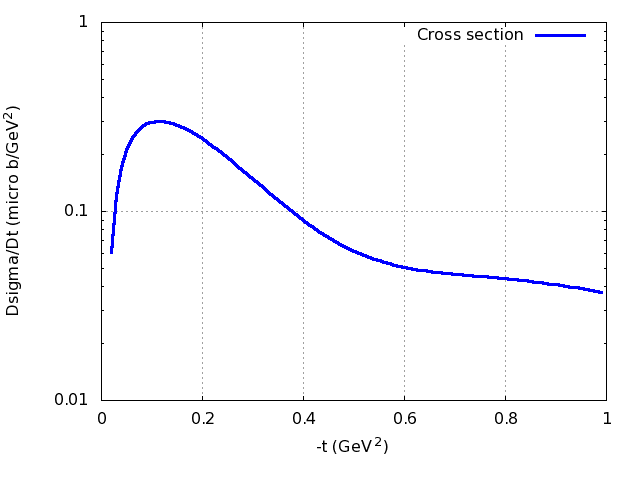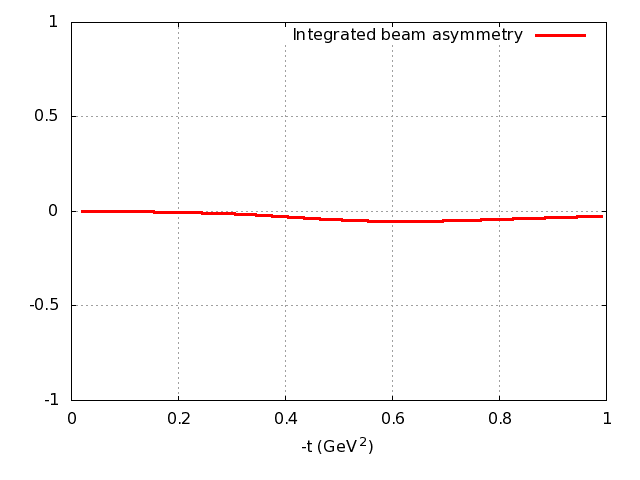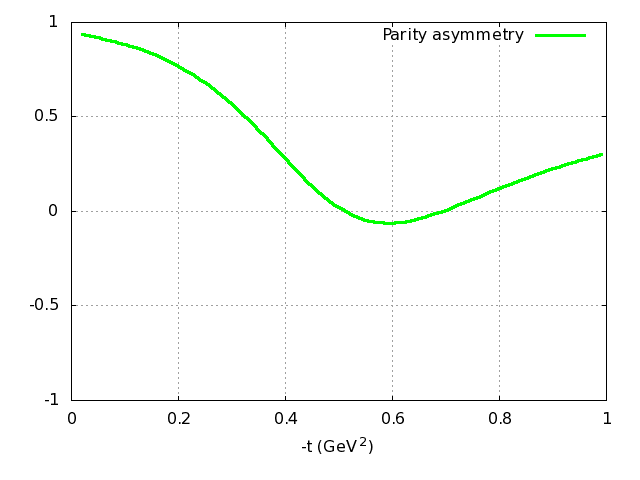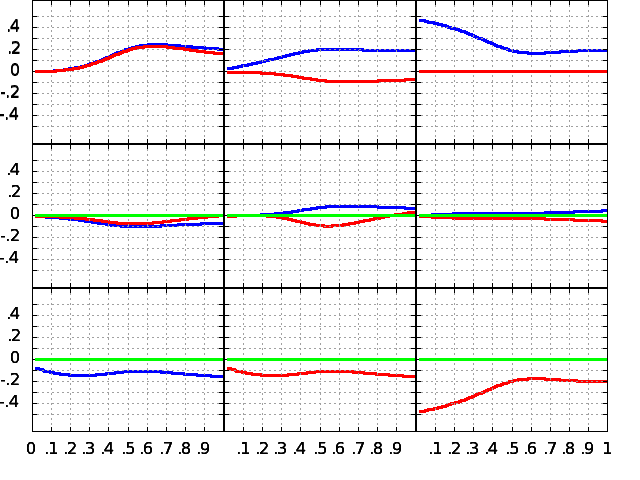 We present the model published in [Mat19a]
concerning tensor meson photoproduction
\begin{align}
\vec \gamma (p_\gamma, \lambda_\gamma) p(p_N, \lambda_p) \to T(p_T, \lambda_T) p(p'_N, \lambda_p'),
\end{align}
with a linearly polarized beam.
The code can be downloaded in Resources section and simulated
in the Simulation section.
We present the model published in [Mat19a]
concerning tensor meson photoproduction
\begin{align}
\vec \gamma (p_\gamma, \lambda_\gamma) p(p_N, \lambda_p) \to T(p_T, \lambda_T) p(p'_N, \lambda_p'),
\end{align}
with a linearly polarized beam.
The code can be downloaded in Resources section and simulated
in the Simulation section.
Models
For each exchange $E = \rho, \omega, b_1, h_1$ the amplitudes takes the form \begin{align} {\cal M}_{\lambda_\gamma \lambda_T ; \lambda_p \lambda'_p} &= -\sum_E T^{E}_{\lambda_\gamma \lambda_T}(t) R^E(s,t) B^E_{\lambda_p \lambda'_p}(t), \end{align} The Regge propagator is given by: \begin{equation}\label{eq:ReggePropa} R(s,t) = \frac{\tau + e^{-i\pi\alpha(t)}}{2} \, (-)^{\ell} \Gamma\left[\ell-\alpha(t)\right] (\alpha' s)^{\alpha(t)} . \end{equation} The Regge trajectories for the vector $V = \rho, \omega$ and the axial-vector $A = h_1,b_1$ are \begin{align*} \alpha_V(t) & = \alpha'_V t + 0.5 & \alpha_A(t) & = \alpha'_A (t-m_\pi^2) \end{align*} The bottom vertex depends on two helicity couplings for the vector exchange and one coupling for the axial-vector exchange. The top vertex depends on five couplings \begin{align} B^{V}_{\lambda_p \lambda'_p}(t) &= \left( \frac{-t'}{4m_p^2} \right)^{\frac{1}{2}|\lambda_p - \lambda'_p|} \left[ G^V_1 \delta_{\lambda_p, \lambda'_p} + 2 \lambda_p G^V_2 \delta_{\lambda_p, -\lambda'_p} \right] \\ B^A_{\lambda_p \lambda_p}(t) &= \left( \frac{-t'}{4m_p^2} \right) G_2^A \delta_{\lambda_p, -\lambda'_p} \\ T^{E}_{\lambda_\gamma \lambda_T}(t) & = \beta^{\gamma T}_E \left(\frac{-t'}{m_T^2}\right)^{\frac{1}{2}|\lambda_\gamma-\lambda_T|} \beta_{\lambda_\gamma \lambda_T}(t). \end{align} The nucleon couplings are \begin{align} G_1^\rho & = 1.63 & G_2^\rho &= 13.01& G_1^\omega &= 8.13& G_2^\omega & = 1.86 \end{align} The fitted overall photon couplings are \begin{align} \text{minimal: }&& \beta^V & = 0.251 \pm 0.053 & \beta^A & = 0.821 \pm 0.023 \\ \text{TMD: }&& \beta^V & = 1.060 \pm 0.073 & \beta^A & = 0.581 \pm 0.053 \\ \end{align} The model includes only isoscalar axial-vector exchanges $\beta^{\gamma T}_{b_1} = 0$. The $a_2$ and $f_2$ couplings are related by isospin relations \begin{align} \beta^V & = \beta^{\gamma a_2}_\omega = 3\beta^{\gamma a_2}_\rho = \beta^{\gamma f_2}_\rho = 3\beta^{\gamma f_2}_\omega , & \beta^A & = \beta^{\gamma a_2}_{h_1} = 3\beta^{\gamma f_2}_{h_1} \end{align} The helicity structures $\beta_{\lambda,\lambda_T}$ for the two models are
| $\beta_{1,2}$ | $\beta_{1,1}$ | $\beta_{1,0}$ | $\beta_{1,-1}$ | $\beta_{1,-2}$ | |
| Minimal | $0$ | $1/2$ | $-1/\sqrt{6}$ | $0$ | $0 $ |
| TMD | $-1/2$ | $-t\big/2m_T^2$ | $t\big/2\sqrt{6} m_T^2$ | $0$ | $0$ |
| M1 | $0$ | $1/4$ | $-1/\sqrt{6}$ | $1/4$ | 0 |
References
[Mat20a] V. Mathieu, et al (JPAC), ``Exclusive tensor meson photoptoduction,'' arXiv:2005.01617 [hep-ph]
Resources
- C/C++: C/C++ file (main.cpp)
- Input file: par_simu.txt .
- Output files: obs.txt , sdme0.txt , sdme1.txt , sdme2.txt , sdme_nat.txt , sdme_unnat.txt .
- gnuplot file: gnuplotObs.txt , gnuplotSDME.txt
- Contact person: Vincent Mathieu
- Last update: May 2020
To compile: gcc main.cpp
- par_simu.txt:
The simulation parameters are $E_\gamma$, $\beta_V$, $\beta_A$, iso, $isGJ$.
iso = 0,1 for $f_2$ / $a_2$ photoproduction. - sdme0.txt and sdme1.txt:
$-t$ (GeV$^2$), $\rho^{0,1}_{00}$, $\rho^{0,1}_{11}$, $\rho^{0,1}_{22}$, $\rho^{0,1}_{10}$, Re $\rho^{0,1}_{1-1}$, Re $\rho^{0,1}_{20}$, Re $\rho^{0,1}_{21}$, Re $\rho^{0,1}_{2-1}$, Re$\rho^{0,1}_{2-2}$ - sdme2.txt:
$-t$ (GeV$^2$), Im $\rho^2_{10}$, Im $\rho^2_{1-1}$, Im $\rho^2_{20}$, Im $\rho^2_{21}$, Im $\rho^2_{2-1}$, Im $\rho^2_{2-2}$ - sdme_nat.txt and sdme_unn.txt:
$-t$, $\rho^{(\pm)}_{00}$, $\rho^{(\pm)}_{11}$, $\rho^{(\pm)}_{22}$, $\rho^{(\pm)}_{10}$, Re $\rho^{(\pm)}_{1-1}$, Re $\rho^{(\pm)}_{20}$, Re $\rho^{(\pm)}_{21}$, Re $\rho^{(\pm)}_{2-1}$, Re$\rho^{(\pm)}_{2-2}$ - obs.txt:
$-t$ (GeV$^2$), $d\sigma/dt$ ($\mu$b/GeV$^2$), $\Sigma_{4\pi}$, $P_\sigma$
Simulation
'; // print horizontal line echo 'Results
'; // simulation parameters $Eg = $_POST["Eg"]; $mod = $_POST["MD"]; $ten = $_POST["TM"]; // $FR = $_POST["FR"]; echo "Simulation at Eg = ", $Eg, " GeV"; switch ($ten){ case 0: echo "Photoproduction of f2(1270)
"; break; case 1: echo "Photoproduction of a2(1320)
"; break; } //switch ($FR){ // case 0: echo "SDME in the helicity frame
"; break; // case 1: echo "SDME in the Gottfried-Jackon frame
"; break; // } echo "SDME in the helicity frame
"; switch ($mod){ case 0: echo "Minimal model
"; break; case 1: echo "Tensor meson dominance model
"; break; } // model parameters switch ($mod){ case 0: $data = array($Eg, " ",$_POST["mV"]," ", $_POST["mA"] ," ",$ten," ", 0, "\n"); break; case 1: $data = array($Eg, " ",$_POST["tV"]," ", $_POST["tA"] ," ",$ten," ", 1, "\n"); break; } $rootPath = getcwd(); // change the directory chdir('PiDelta'); // because the execution write files // in the current directory // for the simulation file_put_contents("simu.txt", $data); exec('./tensor.exe'); // run the program $ret = system('gnuplot44 gnuplotObs.txt ', $response); $ret = system('gnuplot44 gnuplotSDME.txt ', $response); echo "The x-axis of the plots is -t in GeV^2.
"; // Download the plots echo "Download the output files: observables.txt, sdme0.txt, sdme1.txt, sdme2.txt
"; echo "The format of the files is specified above the simulation section.
"; echo "Download the plots: cross section, integrated beam asymmetry, parity asymmetry, SDME"; // Display the plots echo "
"; echo "
 ";
echo "
";
echo " ";
echo "
";
echo "
"; echo "The components of Re rho^0 are in blue.
"; echo "The components of Re rho^1 are in red.
"; echo "The components of Im rho^2 are in green.
"; echo "The SDME component in the3x3 grid are:
"; echo " rho00 rho11 rho22
"; echo " rho10 rho1-1 rho20
"; echo " rho21 rho2-1 rho2-2
"; echo "
 ";
chdir($rootPath); // go back to root directory
}
if(isset($_POST['submit'])) // call the function display if something is submitted
{
display();
}
?>
";
chdir($rootPath); // go back to root directory
}
if(isset($_POST['submit'])) // call the function display if something is submitted
{
display();
}
?>